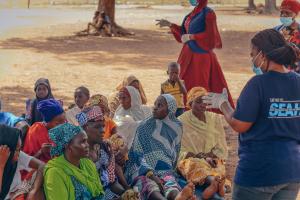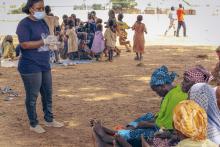Changing the stories of gender-based violence survivors in Adamawa state
Yola, 10 August, 2023 - Gender-based violence and Sexual Exploitation and Abuse(GBV/SEA) is a major threat to public health.
As such, the World Health Organization (WHO) is supporting the government of Adamawa state to provide quality care for survivors of Gender Based Violence, especially those receiving humanitarian aid.
With funding from USAID's Bureau of Humanitarian Assistance (BHA) and the Government of Germany, WHO supported the state government to train 65 health workers and volunteers (tagged GBV Champions) to provide sensitization on GBV and the role of the health provider for survivors in line with the WHO guideline.
The 65 GBV Champions were equipped with the knowledge and skills to identify signs of violence, deliver appropriate first-line support including psychosocial support, and provide appropriate referrals to health facilities and social support services.
Seeking help with confidence
Through their effort, a GBV survivor, 37 years old Jessica Matthew (name changed) was able to get medical support after suffering sexual abuse from her brother-in-law for over five years.
She bore the physical and emotional violence alone, with no health intervention, until she met a GBV champion at Girei Local Government Area (LGA).
“I was living in fear and could not tell anyone. I thought they will not believe me,” she said.
Jessica had suffered health consequences such as depression, anxiety, and self-inflicted injuries as a result of the abuse and had been afraid to speak out for fear of being stigmatized or people not believing her.
“Aside from the health intervention and counselling by the health worker, I was able to inform my husband about the abuse and he believed me because he also had an opportunity to be educated by the health officers, she said smiling.
GBV has serious short- and long-term consequences on women’s physical, sexual and reproductive and mental health, as well as on their personal and social well-being.
While there is no data on the prevalence of GBV in a humanitarian context from Adamawa state, Nigeria Demographic Health Survey estimates that 44.4 % of women aged 15 – 49 in the state have experienced physical, emotional, or sexual violence in their lifetime.
In humanitarian situations, the levels of sexual and/or intimate partner violence and other forms of violence based on gender inequality (GBV for gender-based violence) grows more severe.
As part of the humanitarian response plan 2023, 1,317,980 million individuals, are targeted for GBV interventions. Of which, 32% are IDPs, 25% are returnees and 43% are host community members, and out of the total targets, 34% are situated in Yola, Adamawa state.
Providing support
In her submission, Dr Beatrice Mauraguri, WHO Emergency Manager in the northeast, Nigeria said “GBV is a major concern in the humanitarian northeast states.
“Health systems can help women survivors of violence and WHO is supporting the health sector to respond to GBV, including physical, sexual, and emotional violence, all of which can have serious consequences for physical, psychological, and reproductive health.
From January to May 2023, over 141,200 women have been reached with GBV key messages in Adamawa state. WHO remains committed to ensuring the prevention of gender-based violence is sustained and access to credible information is provided to vulnerable and susceptible women and girls in Adamawa state,” said Dr Muraguri.
Additionally, Mrs Uziel Tulhungu, the Reproductive Health Coordinator and Gender-Based Officer in Adamawa state said with the training, the GBV champions have been educating the members of the communities about the dangers of GBV/SEA and earning their trust to open up, as well as seeking medical intervention.
Mrs Tulhungu further appreciated WHO for its support stressing that it has created an avenue for health and psychosocial intervention for abused persons through developing and strengthening the skills, instincts, and abilities of health workers to respond and provide quality tailored GBV health services in the communities.
To ensure real-time access to holistic health services, the GBV champions supported by the WHO continuously provide GBV services, including GBV messages to the vulnerable people living in IDP camps, host communities, and hard-to-reach locations.
For efficacy, WHO is partnering with civil society organizations in the state and its mobile health teams, to ensure that these communities are reached with GBV services.
Technical contact:
Dr Oyinloye, Inigbehe; Email: oyinloyei [at] who.int (oyinloyei[at]who[dot]int)

